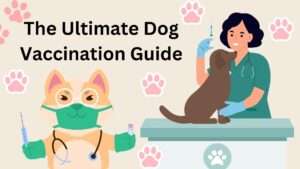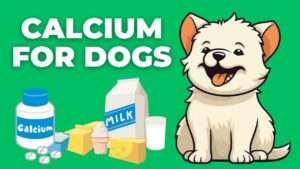In the pursuit of keeping our furry friends in the best of health, pet owners often seek out various supplements to enhance their well-being. One such supplement that has gained significant attention is omega-3 fatty acids. But what exactly are omega-3s and how can they benefit our canine companions? In this comprehensive guide, we delve into the world of omega-3 for dogs, exploring its benefits, sources, dosage, and more. Let’s uncover the vital health tips surrounding omega-3 supplementation for your beloved pets.
Contents Overview
Understanding Omega-3 Fatty Acids
Omega-3 fatty acids are a type of polyunsaturated fat that are essential for maintaining good health in both humans and animals. They are classified as essential fatty acids because the body cannot produce them on its own and must obtain them through dietary sources. Omega-3s are renowned for their numerous health benefits, particularly their anti-inflammatory properties and their role in supporting various bodily functions.
Types of Omega-3 Fatty Acids
Three main types of omega-3 fatty acids are of nutritional significance:
- Alpha-linolenic Acid (ALA): ALA is primarily found in plant-based sources such as flaxseeds, chia seeds, and walnuts. It is considered an essential fatty acid because the body cannot synthesize it and must obtain it from dietary sources.
- Eicosapentaenoic Acid (EPA): EPA is predominantly found in marine sources such as fatty fish like salmon, mackerel, and sardines. It is highly regarded for its anti-inflammatory properties and its role in supporting cardiovascular health.
- Docosahexaenoic Acid (DHA): DHA is also found in marine sources and is particularly abundant in fish oil. It is crucial for brain development and function, as well as for maintaining healthy eyesight.
Benefits of Omega-3 for Dogs
Omega-3 fatty acids offer a plethora of health benefits for dogs, ranging from improved skin and coat health to enhanced joint function and cognitive well-being. Let’s delve into the various advantages in detail:
- Promotes Healthy Skin and Coat:
- Omega-3 fatty acids play a crucial role in maintaining skin integrity and hydration.
- They help alleviate dryness, itching, and flakiness, promoting a soft, shiny coat.
- Omega-3s can reduce inflammation associated with skin conditions like allergies, eczema, and dermatitis.
- Supports Joint Health:
- The anti-inflammatory properties of omega-3s can help alleviate joint pain and stiffness in dogs with arthritis or other joint conditions.
- EPA and DHA, two types of omega-3s, help reduce inflammation in the joints, improving mobility and flexibility.
- Omega-3 supplementation may slow the progression of degenerative joint diseases and delay the need for pain management medications.
- Boosts Cardiovascular Health:
- Omega-3 fatty acids support heart health by reducing triglyceride levels, improving blood circulation, and lowering blood pressure.
- They help maintain optimal heart function and may reduce the risk of cardiovascular diseases such as heart attacks and strokes.
- Omega-3s can also help prevent the formation of blood clots, reducing the risk of thrombosis.
- Enhances Cognitive Function:
- DHA, a type of omega-3 fatty acid, is essential for brain development and function in dogs.
- Omega-3 supplementation may improve cognitive function and memory in aging dogs, slowing down age-related cognitive decline.
- It can support overall mental sharpness and alertness, enhancing your dog’s quality of life as they age.
- Alleviates Allergies:
- Omega-3 fatty acids have anti-inflammatory properties that can help reduce the severity of allergic reactions in dogs.
- They can decrease itching, redness, and inflammation associated with food allergies, environmental allergies, and flea allergies.
- Omega-3 supplementation may complement traditional allergy treatments, providing relief from allergic symptoms.
- Supports Immune Function:
- Omega-3s play a role in regulating the immune system, helping to maintain a healthy immune response in dogs.
- They may enhance the body’s ability to fight off infections and diseases, reducing the risk of illness and promoting overall well-being.
- Aids in Weight Management:
- Omega-3 fatty acids can support weight management in dogs by promoting satiety and reducing appetite.
- They may help maintain lean muscle mass while supporting healthy weight loss in overweight or obese dogs.
- Omega-3 supplementation can contribute to a balanced diet and exercise regimen for dogs undergoing weight management programs.
- Improves Eye Health:
- DHA is a major component of the retina and is essential for maintaining healthy eyesight.
- Omega-3 supplementation may help prevent age-related vision problems and support overall eye health in dogs.
Sources of Omega-3 for Dogs
Ensuring that your dog receives an adequate intake of omega-3 fatty acids is essential for maintaining their overall health and well-being. Omega-3s can be obtained from various dietary sources, each offering unique benefits and considerations. Let’s explore the different sources of omega-3 for dogs in detail:
- Fish Oil:
- Fish oil is one of the most popular and effective sources of omega-3 fatty acids for dogs.
- Rich in EPA (eicosapentaenoic acid) and DHA (docosahexaenoic acid), fish oil provides readily available forms of omega-3s that are easily absorbed by the body.
- Fatty fish such as salmon, mackerel, sardines, and trout are particularly rich in omega-3 fatty acids and serve as excellent sources of fish oil.
- Fish oil supplements specifically formulated for dogs are available in liquid or capsule form, making it convenient to administer the correct dosage based on your dog’s size and needs.
- Krill Oil:
- Krill oil is derived from tiny crustaceans called krill and contains high levels of EPA and DHA, similar to fish oil.
- In addition to omega-3 fatty acids, krill oil also contains astaxanthin, a powerful antioxidant that provides additional health benefits for dogs.
- Krill oil supplements may be preferred by some pet owners due to their sustainability and lower risk of contamination with environmental toxins.
- Algal Oil:
- Algal oil is a vegetarian alternative to fish oil that is derived from algae, a primary source of omega-3 fatty acids in the marine food chain.
- Algal oil supplements provide EPA and DHA in bioavailable forms, making them suitable for dogs with dietary restrictions or allergies to fish.
- Algal oil is also considered a sustainable source of omega-3s, as it does not contribute to overfishing or environmental depletion of marine resources.
- Flaxseed Oil:
- Flaxseed oil is a plant-based source of omega-3 fatty acids that contains alpha-linolenic acid (ALA), a precursor to EPA and DHA.
- While not as potent as marine-based sources, flaxseed oil can still provide valuable omega-3s for dogs, particularly those on vegetarian or vegan diets.
- Flaxseed oil may be incorporated into your dog’s diet by drizzling it over their food or mixing it into homemade treats or recipes.
- Whole Foods:
- In addition to supplements, omega-3 fatty acids can also be obtained from whole foods that are naturally rich in these essential nutrients.
- Fatty fish such as salmon, mackerel, and sardines can be included in your dog’s diet as a source of omega-3s.
- Other whole food sources of omega-3s include walnuts, chia seeds, and hemp seeds, which can be incorporated into homemade dog treats or added to their meals.
Considerations for Choosing Omega-3 Sources:
- Bioavailability: Opt for sources of omega-3 fatty acids that provide EPA and DHA, as these are the most bioavailable forms for dogs.
- Purity and Quality: Choose reputable brands of fish oil or krill oil supplements that undergo rigorous testing for purity and quality to ensure they are free from contaminants such as heavy metals and toxins.
- Dosage and Administration: Follow the recommended dosage guidelines provided by your veterinarian when administering omega-3 supplements to your dog, and be mindful of any potential interactions with other medications or supplements.
- Dietary Preferences and Restrictions: Consider your dog’s dietary preferences and any food allergies or sensitivities they may have when selecting omega-3 sources, and consult with your veterinarian if you have any concerns or questions.
By incorporating omega-3 fatty acids into your dog’s diet through a variety of sources, you can ensure they receive the essential nutrients needed to support their overall health, vitality, and longevity.
Dosage and Administration
Determining the appropriate dosage of omega-3 fatty acids for your dog is essential to ensure they receive the optimal benefits without any adverse effects. The dosage may vary depending on factors such as your dog’s size, age, health condition, and the specific omega-3 supplement being used. Here’s a comprehensive guide to dosage and administration of omega-3 for dogs:
- Consultation with Veterinarian:
- Before starting your dog on omega-3 supplementation, it’s crucial to consult with your veterinarian.
- Your vet can assess your dog’s overall health, consider any existing medical conditions or medications, and provide personalized recommendations for omega-3 supplementation.
- Determination of Correct Dosage:
- The dosage of omega-3 supplements for dogs is typically based on the concentration of EPA (eicosapentaenoic acid) and DHA (docosahexaenoic acid) in the product.
- Your veterinarian will calculate the appropriate dosage based on your dog’s weight and health status, as well as the specific health benefits you’re aiming to achieve.
- General Guidelines for Dosage:
- While dosage recommendations may vary, here are some general guidelines for dosing omega-3 supplements for dogs:
- Small dogs (<20 lbs): 75-150 mg of combined EPA/DHA per day
- Medium dogs (20-50 lbs): 200-400 mg of combined EPA/DHA per day
- Large dogs (>50 lbs): 500-1000 mg of combined EPA/DHA per day
- Type of Omega-3 Supplement:
- The type of omega-3 supplement you choose will also influence the dosage.
- Fish oil, krill oil, and algal oil supplements may have different concentrations of EPA and DHA, so it’s essential to select a product that provides the appropriate levels for your dog’s needs.
- Administration Methods:
- Omega-3 supplements for dogs are available in various forms, including liquid, capsules, and chewable treats.
- Liquid supplements can be easily added to your dog’s food, while capsules may be given whole or punctured and mixed into food.
- Chewable treats offer a convenient way to administer omega-3s, especially for dogs who may be picky eaters or have difficulty swallowing pills.
- Monitoring and Adjustment:
- After starting omega-3 supplementation, monitor your dog for any changes in health or behavior.
- Keep track of their skin and coat condition, joint mobility, and overall well-being to assess the effectiveness of the supplement.
- If necessary, your veterinarian may adjust the dosage based on your dog’s response or changes in their health status over time.
- Consistency and Compliance:
- Consistency is key when administering omega-3 supplements to your dog.
- Follow the recommended dosage schedule provided by your veterinarian and ensure that your dog receives their supplement regularly to maintain optimal levels of omega-3 fatty acids in their system.
- Potential Side Effects:
- While omega-3 supplements are generally safe for dogs, excessive intake may lead to potential side effects such as gastrointestinal upset (e.g., diarrhea, vomiting) or increased susceptibility to bleeding.
- If you notice any adverse reactions or concerns, consult your veterinarian immediately for guidance and appropriate management.
Potential Side Effects
While omega-3 fatty acids offer numerous health benefits for dogs, it’s essential to be aware of potential side effects that may occur with supplementation. Understanding these side effects can help you monitor your dog’s response to omega-3 supplements and take appropriate action if necessary. Here’s a detailed overview of potential side effects:
- Gastrointestinal Upset:
- One of the most common side effects of omega-3 supplementation in dogs is gastrointestinal upset, which may manifest as diarrhea, vomiting, or flatulence.
- Some dogs may have sensitive stomachs and may experience digestive disturbances when introduced to omega-3 supplements for the first time.
- Gastrointestinal side effects are usually mild and temporary, but if they persist or worsen, it’s important to consult with your veterinarian.
- Increased Susceptibility to Bleeding:
- Omega-3 fatty acids have natural blood-thinning properties, which can increase your dog’s susceptibility to bleeding, particularly if they are taking other medications or supplements that also have blood-thinning effects.
- Dogs with bleeding disorders or those undergoing surgery may be at higher risk of excessive bleeding if they are receiving high doses of omega-3 supplements.
- It’s crucial to inform your veterinarian if your dog is on any medications, especially blood thinners or anti-inflammatory drugs, to avoid potential interactions and complications.
- Weight Gain:
- Omega-3 supplements, particularly fish oil, are calorie-dense and can contribute to weight gain if given in excessive amounts.
- Dogs that consume more calories than they expend may experience weight gain, which can lead to obesity and associated health problems such as joint pain, diabetes, and cardiovascular disease.
- It’s important to monitor your dog’s calorie intake from all sources, including omega-3 supplements, and adjust their diet and exercise accordingly to maintain a healthy weight.
- Allergic Reactions:
- While rare, some dogs may develop allergic reactions to omega-3 supplements, particularly those derived from fish or shellfish.
- Allergic reactions may manifest as itching, hives, facial swelling, or difficulty breathing.
- If your dog exhibits any signs of an allergic reaction after taking omega-3 supplements, discontinue use immediately and seek veterinary attention.
- Interactions with Medications:
- Omega-3 supplements may interact with certain medications, especially blood thinners such as aspirin or warfarin, as well as nonsteroidal anti-inflammatory drugs (NSAIDs) like carprofen or meloxicam.
- Combining omega-3 supplements with these medications can potentiate their effects and increase the risk of bleeding or gastrointestinal irritation.
- Always inform your veterinarian of any medications or supplements your dog is taking to prevent potential interactions and ensure their safety.
Monitoring and Management:
- When starting your dog on omega-3 supplementation, closely monitor their response for any signs of side effects.
- Start with a low dose and gradually increase it as tolerated to minimize the risk of adverse reactions.
- If your dog experiences any side effects, discontinue the supplement and consult with your veterinarian for further guidance.
- Regular veterinary check-ups can help assess your dog’s overall health and adjust their supplementation regimen as needed.
Bottom Line
Incorporating omega-3 fatty acids into your dog’s diet can offer a myriad of health benefits, ranging from improved skin and coat health to enhanced joint function and cognitive well-being. By understanding the importance of omega-3s and selecting the right supplements, you can contribute to your canine companion’s overall vitality and longevity. Remember to consult with your veterinarian to determine the optimal dosage and ensure the well-being of your furry friend. With the right approach, omega-3 supplementation can be a valuable addition to your dog’s healthcare regimen, promoting a happier, healthier life.




































+ There are no comments
Add yours